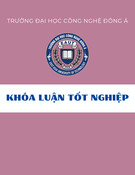
MINISTRY OF EDUCATION AND TRAINING THE STATE BANK OF VIETNAM
BANKING UNIVERSITY OF HO CHI MINH CITY
VU CAM NHUNG
EVALUATING THE IMPACTS OF SOCIAL CAPITAL TO ACTIVITIES OF
COMMERCIAL BANKS IN HO CHI MINH CITY
SUMMARY OF DOCTORAL THESIS
Major: Finance - Banking
Code: 9.34.02.01
Academic advisor: Assoc. Prof. Dr. Nguyen Thi Nhung
Dr. Huynh Thanh Dien
HO CHI MINH CITY - 2018

1
CHAPTER 1: INTRODUCTION
1.1 The urgency of the research topic
The activities of business in general and commercial banks in particular are
dominated by all social relationships. In the process of its operation, banks are able to link
well with customers, partners, projects and programs, the mobilization of capital, loans,
investment ... is also more convenient.
Beside the positive side, the relationships also show the negative side. In the last
period, the phenomenon of mutual acquisition between banks, take advantage of
relationships with officials to serve the interests of the individual group, causing market
manipulation and psychological insecurity for market participants (Nguyen Duc Chien
2013). Recent economic cases involving bank leaders have caused thousands of billion loss
to the economy, partly due to social ties, including relationship of bank leaders. At the same
time, there are still phenomena of internal collusion for funds, fake record for savings,
loans... causing loss of reputation for banks and affecting to the banks ‘s development. In
particular, fraudulent lending in developing economies such as Vietnam is quite high,
influence the results of the bank deeply (Leonard Onyiriuba 2016). After the crisis in 2007-
2009, confidence in the financial services industry has been severely diminished (Benamati
et al. 2010). Trust is an important foundation for the bank's sustainable development.
Faith is also the basic core to building and developing a network of relationships
(social capital) (Dasgupta 2002; Koniordos 2005 quoted in Crystal Holmes Zamanian &
Lisa Åström 2014). The study of social capital for the banking sector in the context of low
credibility, such as the banking industry (one of the least reliable with 49% compare with
technology, or electronic production with 70-73% in the world ranking (Edelman Trust
Barometer 2013) is essential and this research is also potential to clarify social capital for
the financial services industry and contribute to the current context, when the faith is
affected after the crisis (Maskell 2000).
Social relationships are both positive and negative. Especially, last time the negative
in the banking sector is a big problem for the society, so the banks themselves and the
government need a theoretical framework to realize the impact of these relationships on the

2
bank's operations as well as solutions to promote positive effects and limit negative effects
from these social relationships. This helps commercial banks to effectively use these
relationships in their business operations.
The relationship between social capital in the banking sector, there have been studies
in the world and in Vietnam, such as Xie Wenjing (2013; Crystal Holmes Zamanian and
Lisa Åström (2014); Heru Sulistyo and the authors (2015); Justin Yiqiang & the authors
(2017); Huynh Thanh Đien (2011). Most of the research is qualitative and only deals with
some aspects of the relationship between social capital and banking, and there is no study
evaluating the relationship between social capital and the activities of Bank. That's the space
for the researcher.
Starting from the above mentioned, the author has chosen to study the topic of
"Evaluating the impact of social capital to the activities of commercial banks in Ho Chi
Minh City".
1.2. Research objectives and questions
General goal:
Assess the impact of social capital on business activities of commercial banks in order
to exploit the positive role and limit the negative impact of social capital on business
activities of commercial banks in Ho Chi Minh city
Detail goal:
- Discover and measure the composition of the bank's social capital and business
activities of Vietnamese commercial banks.
- Accreditation of the scale and model testing about banks ‘s social capital affect
to the activities of commercial banks in Vietnam, typical case: commercial banks in Ho Chi
Minh City.
- Suggesting policy to help commercial banks in Ho Chi Minh City improve their
performance through the use of social capital. At the same time, suggest policy to help
policymakers and government support Vietnamese commercial banks develop positive
forms of social linkages and limit the form of negative social linkages.
Research question:

3
To achieve the above objectives, the topic should answer the following research
questions:
- How are the social capital of the bank and the activities of the commercial banks
recognized and measured?
- How is the model of research on social capital affecting the operation of commercial
banks built in Vietnam?
- What are the policy implications of improving the performance of commercial banks
through the use of social capital?
1.3. Research subject, scope and research method
Research subject:
The research is to study the impact of social capital on the activities of commercial
banks in Ho Chi Minh City. The surveyed subjects are leaders (directors/deputy directors of
branches) of commercial banks in Ho Chi Minh City.
Scope:
The study is limited to commercial banks operating in Ho Chi Minh City between
June 2015 and December 2016.
Research method:
To achieve the research objectives and answer the research questions posed by the
topic, the thesis using qualitative and quantitative methods will be presented in chapter 3.
1.4 The main contribution of the thesis
The scientific contributions:
- The first contribution of the thesis was to build up a full social capital scale in all
three aspects of the internal, external networks and the bank leadership on the basis of
theoretical and qualitative research, private features of Vietnam banking.
- The research identified the basic groups of commercial banks as capital
mobilization, using capital and providing service activities. The scale of commercial banks'
activities has been tested for credibility in the case of Vietnamese commercial banks,
ensuring the value and reliability of their assets so that they can be inherited for related
research in Vietnam.

4
- The research results show the direct and indirect effects of social capital on the
groups operating in commercial banks, thus confirming that social capital is a resource that
banks need to plan for its business strategy is to be able to exploit and use effectively in the
business process of the bank. The results of the model test for the typical case of Ho Chi
Minh City have contributed to the theoretical as well as the scientific basis, contributing to
the foundation of further research about the relationship between social capital and business
activities is not only in the banking industry but also in other economic sectors.
Practical contributions
- The thesis has built and tested the social capital scale on all three aspects include of
the inside, out side and the bank leadership, which helps the bank to identify the framework
for creating, using, development and assessment of social capital in the bank. Banks will
then devise strategies to exploit, develop and use social capital to promote business
activities.
- The dissertation has developed and tested the scale of commercial banks' business
groups, while pointing out the link between all activities through out the theoretical and
practical accreditation activities in Ho Chi Minh City. This will help banks to evaluate more
comprehensive operational groups.
- The thesis also shows the positive and negative effects of social capital in the
banking sector. This will help state management agencies at all levels to recognize the
importance and motivation of this resource to timely formulate policies to promote positive
forms of social cohesion. Limited form of negative social capital in the banking sector of
Vietnam.
- The results of the thesis also support the association of Ho Chi Minh City Bank and
the Vietnam Bankers Association in recognizing the importance of social capital as well as
creating value from the affiliate networks. Members of the association can exploit the
benefits of these networks for the business process.
1.5 The organization of the study
Chapter 1: Introdution
Chapter 2: Theoretical foundation and analytical framework for the relationship
between social capital and commercial banking activities

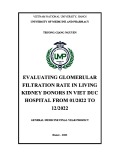
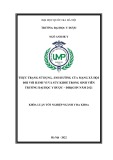
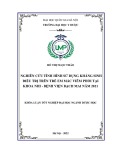


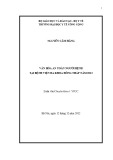
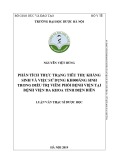

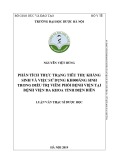
![Bài thu hoạch tuần sinh hoạt công dân đầu năm ngành y đa khoa [chuẩn nhất]](https://cdn.tailieu.vn/images/document/thumbnail/2018/20181006/dangnguyentran/135x160/7471538832432.jpg)



